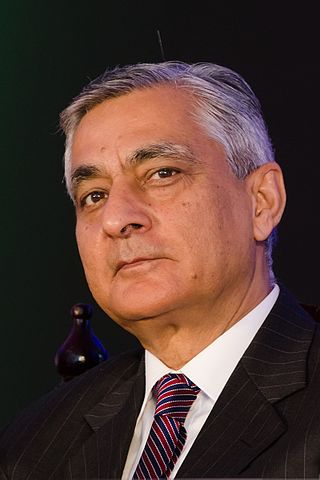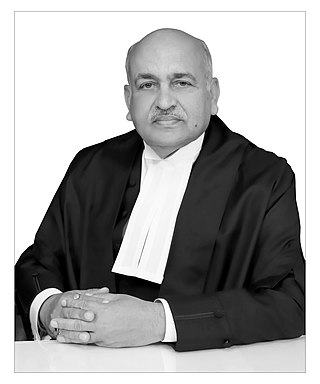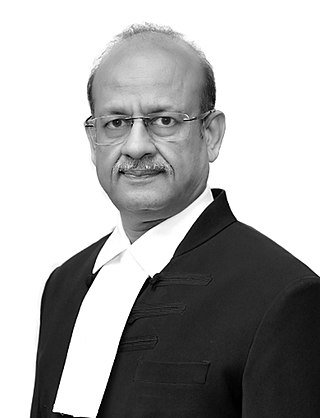Related Research Articles

Adarsh Sein Anand was the 29th Chief Justice of India, serving from 10 October 1998 to 31 October 2001.
The high courts of India are the highest courts of appellate jurisdiction in each state and union territory of India. However, a high court exercises its original civil and criminal jurisdiction only if the subordinate courts are not authorized by law to try such matters for lack of pecuniary, territorial jurisdiction. High courts may also enjoy original jurisdiction in certain matters, if so designated specially by the constitution, a state or union law.

Allahabad High Court, officially known as High Court of Judicature at Allahabad is the high court based in the city of Prayagraj, formerly known as Allahabad, that has jurisdiction over the Indian state of Uttar Pradesh. It was established on 17 March 1866, making it one of the oldest high courts to be established in India.

Markandey Katju is an Indian jurist and former judge of Supreme Court of India who served as chairman for the Press Council of India from 2011 to 2014. He is the son of politician Shiva Nath Katju and grandson of Kailash Nath Katju. He is the founder and patron of the Indian Reunification Association (IRA), an organisation that advocates for the peaceful reunification of what is now Pakistan and Bangladesh with India under a secular government.

Mehr Chand Mahajan was the third chief justice of the Supreme Court of India. Prior to that he was the prime minister of the state of Jammu and Kashmir during the reign of Maharaja Hari Singh and played a key role in the accession of the state to India. He was the Indian National Congress nominee on the Radcliffe Commission that defined the boundaries of India and Pakistan.
Mufti Baha-ud-Din Farooqi was a Kashmiri lawyer, jurist and political figure who served as the 12th Chief Justice of the High Court of Jammu and Kashmir.

Justice Syed Mahmood was Puisne Judge of the High Court, in the North-Western Provinces of British India from 1887 to 1893, after having served in the High Court in a temporary capacity as officiating judge on four previous periods since 1882.
Justice Bilal Nazki is an Indian jurist. He is a former Chief Justice of Orissa High Court and has served as High Court Judge in the High Courts of Jammu & Kashmir, Andhra Pradesh and Bombay. He has also served as the Chairman of the Jammu & Kashmir State Human Rights Commission and the Human Rights Commission of Bihar. He also headed the committee set up by the Government of India to review the functioning of the Haj Committee of India and its state units.
Nisar Ahmad Kakru was the Chief Justice of the High Court of Andhra Pradesh, India from 19 February 2010 to 26 October 2011.

Tirath Singh Thakur is an Indian jurist who served as the 43rd Chief Justice of India (CJI) from 3 December 2015 to 4 January 2017. Before being elevated to the Supreme Court, he served as the Chief Justice of Punjab and Haryana High Court from August 2008 to November 2009 .He has also served as a senior judge in Karnataka High Court from March 1994 to July 2004 and Jammu and Kashmir High Court from February to March 1994.
Ram Prakash Sethi was an Indian judge who served as a judge of the Supreme Court of India. He began practicing law in 1961. Sethi was enrolled as Pleader in 1961, as Vakil in 1962, and as advocate in 1967. He practiced law for 25 years. Before elevation to the Jammu & Kashmir High Court on 30 May 1986, was Special Public Prosecutor for cases under Jammu & Kashmir Enemy Agents Ordinance, appointed Additional Advocate General of Jammu & Kashmir State in 1975 but resigned after nine months. Was the Standing Counsel of various prestigious organizations and institutions such as the University of Jammu, Jammu & Kashmir Financial Corporation, represented State of Jammu & Kashmir in the Supreme Court in the review matter of Keshwanand Bharti's case.
Syed Murtaza Fazl Ali judge of the Supreme Court of India and Chief Justice of the Jammu and Kashmir High Court.

Pankaj Mithal is a Judge of the Supreme Court of India. He is the former Chief Justice of the Rajasthan High Court. Previously, he has also served as the Chief Justice of the Jammu & Kashmir and Ladakh High Court and Judge of the Allahabad High Court.
Justice Gita Mittal is an Indian judge. She is the former Chief Justice of the Jammu and Kashmir High Court and the first woman judge to serve in that capacity. She has also served as the Acting Chief Justice and Judge of Delhi High Court.
Ramalingam Sudhakar is an Indian Judge. He is former Chief Justice of Manipur High Court. He is also former Acting Chief Justice of Jammu and Kashmir High Court and Judge of Jammu and Kashmir High Court and Madras High Court. He was born on 14 February 1959 and hails from Panapakkam Village, Vellore District in Tamil Nadu. He was overlooked and V. Ramasubramanian was chosen over him as a Supreme Court Judge. The Central Government has approved the appointment of former Chief Justice of Manipur High Court, Justice Ramalingam Sudhakar as the president of the National Company Law Tribunal (NCLT) for a period of five years in October 28, 2021. Justice Sudhakar has been appointed for a period of five years from the date of appointment or till he attains the age of 67 or until further orders, whichever is earlier.
Jagadish Bhalla is an Indian Judge and former Chief Justice of Himachal Pradesh and Rajasthan High Court.
Rekha Dikshit is a former judge of Allahabad High Court, in Uttar Pradesh, India. She has been the trial judge in several notable cases, including the case of Mohd. Ahmed Khan v. Shah Bano Begum, a controversial case concerning the payment of maintenance to Muslim women in India, as well as the Taj Corridor case and the Uttar Pradesh NRHM scam.

Rajesh Bindal is a judge of Supreme Court of India. He is the former chief justice of Allahabad High Court. He has also earlier served as the acting chief justice of the Jammu and Kashmir High Court and the Calcutta High Court.
References
- ↑ "Supreme Court of India - Former Judges". Archived from the original on 4 March 2016. Retrieved 20 September 2015.
- ↑ "Justice Saiyed Saghir Ahmed | Aligarh Movement". aligarhmovement.com. Retrieved 24 January 2018.
- ↑ http://hc.ap.nic.in/aphc/ssaj.html
- ↑ Masood, Naved (2 February 2011). "Obituary: Justice Saiyed Saghir Ahmed". TwoCircles.net. Retrieved 7 June 2019.